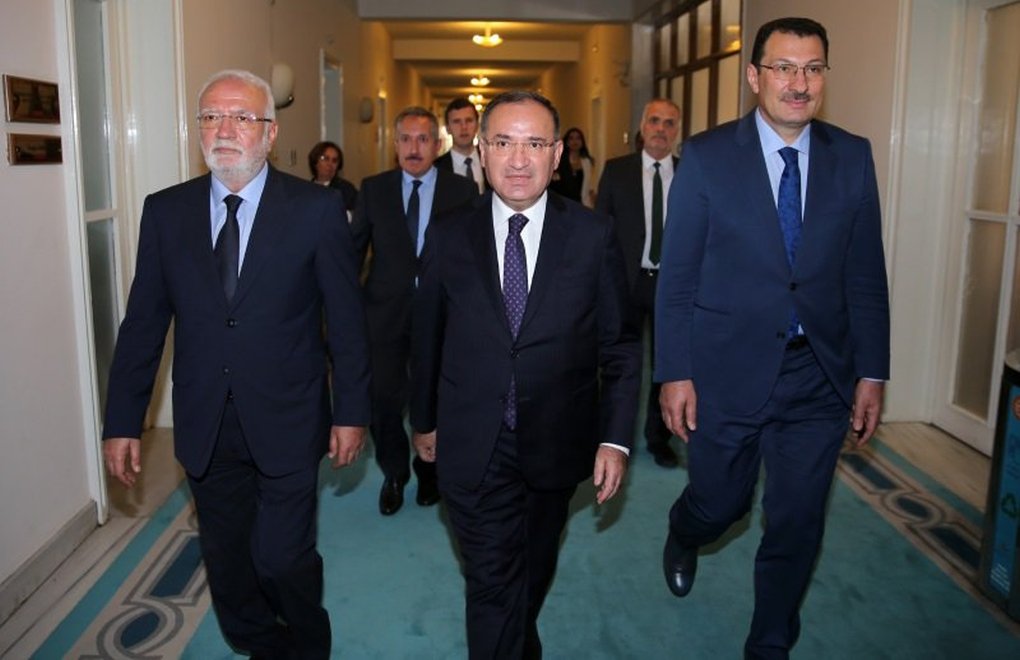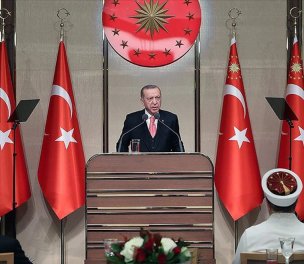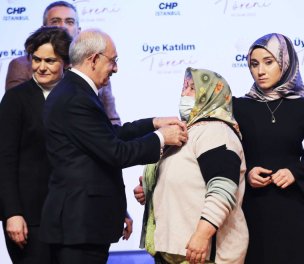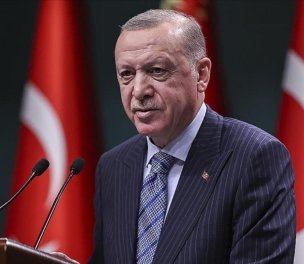Justice Minister Bekir Bozdağ (m) led the AKP delegation. (Photo: AA)
A Justice and Development Party (AKP) delegation made a quick tour in the parliament yesterday (October 2) for their 'headscarf' constitutional amendment proposal.
Prepared as instructed by President and AKP Chair Recep Tayyip Erdoğan, the proposal includes "constitutional protection for womens' headscarf" and "protection of the family" involving a change in the legal definition of the family as it reads in the Constitution of Türkiye, so as to prevent LGBTI+ marriages.
The AKP delegation, led by Bekir Bozdağ, the Minister of Justice, visited the Nationalist Movement Party (MHP), the AKP's ally, first and then the opposition parties with parliamentary groups, seeking their support for their proposal.
The main opposition Republican People's Party (CHP) told the AKP delegation that they had a law draft already presented to the Parliament and asked for their support to the law, saying 'they will not participate in common work for a constitutional amendment' on grounds that 'the new constitution must be the job of the new parliament.'
"Referendum for fundamental rights"
The delegation led by Bozdağ also visited the İYİ (Good) Party and the Peoples' Democratic Party (HDP).
HDP Group deputy chairperson Meral Danış-Beştaş said after the visit that they would be bringing up the proposal of the ruling party in their executive councils.
Beştaş said, "Our attitude towards freedom of dress, headscarf and women's rights is very clear. We never had a negative attitude. We will decide on our decision in this period in our councils."
But Beştaş also said, "We do not think that a referendum on rights or freedoms is accurate."
İYİ Parti also announced that they would be discussing the proposal in their executive councils.
"We'll see who is for the freedoms and family"
CHP brought up "legal protection for headscarf" first, early in October, to which Erdoğan responded, outbidding and calling for "constitutional protection" for headscarf and plus an amendment "to protect the family."
In the AKP parliamentary group meeting yesterday (November 2) Erdoğan said that they would be presenting their final proposal to the speaker's office after talking to the political parties which have parliamentary groups.
He said, "I believe that this proposal will close the headscarf issue so as not to be opened again and that it will serve as litmus paper for the opposition. We will see who is for the freedoms and for the family, and who is for fascism and for perversions."
Erdoğan also said, "We hope that our constitutional amendment proposal will be adopted with broad agreement. If this is not the case, we are ready to take all steps including a referendum. We were never afraid of the judgment of our people.If the necessary majority is not constituted in the parliament our people will have the last say."
The headscarf issue in TürkiyeAfter the 1980 coup d'état, the military government issued a series of regulations banning women in the public sector and students in non-tertiary education from covering their heads. In the 1990s, the ban was expanded to university students, which led to widespread protests across the country. In 1999, Merve Kavakçı, who was elected an MP from the Virtue (Fazilet) Party, an Islamist predecessor of Erdoğan's AKP, was prevented from taking oath in the parliament for violating the parliament's internal regulations. When the AKP nominated then-Foreign Minister Abdullah Gül for the presidency in 2007, her spouse, Hayrünnisa Gül, being a veiled woman was at the center of the debate, with the critics arguing that it would be against the principle of secularism in the Constitution. Gül was eventually elected the president after the Nationalist Movement Party (MHP) decided to support the AKP. In the following years, the AKP gradually lifted the headscarf ban with a series of laws and regulations. Following a 2008 law, university students eventually became free to wear headscarves, despite the initial resistance from the Higher Education Council and some universities to implement the law. After the parliament passed a "democratization package" in October 2013, four of its MPs attended the parliament's General Assembly wearing headscarves. Lawyers and teachers were also allowed to wear a headscarf with the same package. After the June 2015 elections, Lütfiye Selva Çam of the AKP became Türkiye's first veiled MP to take oath in the parliament. The first judge with a headscarf was appointed following the elections in November 2015. The police and the army allowed their women personnel to wear headscarves in 2016 and 2017, respectively. Currently, there is no restriction on headscarves in the public sector. |








